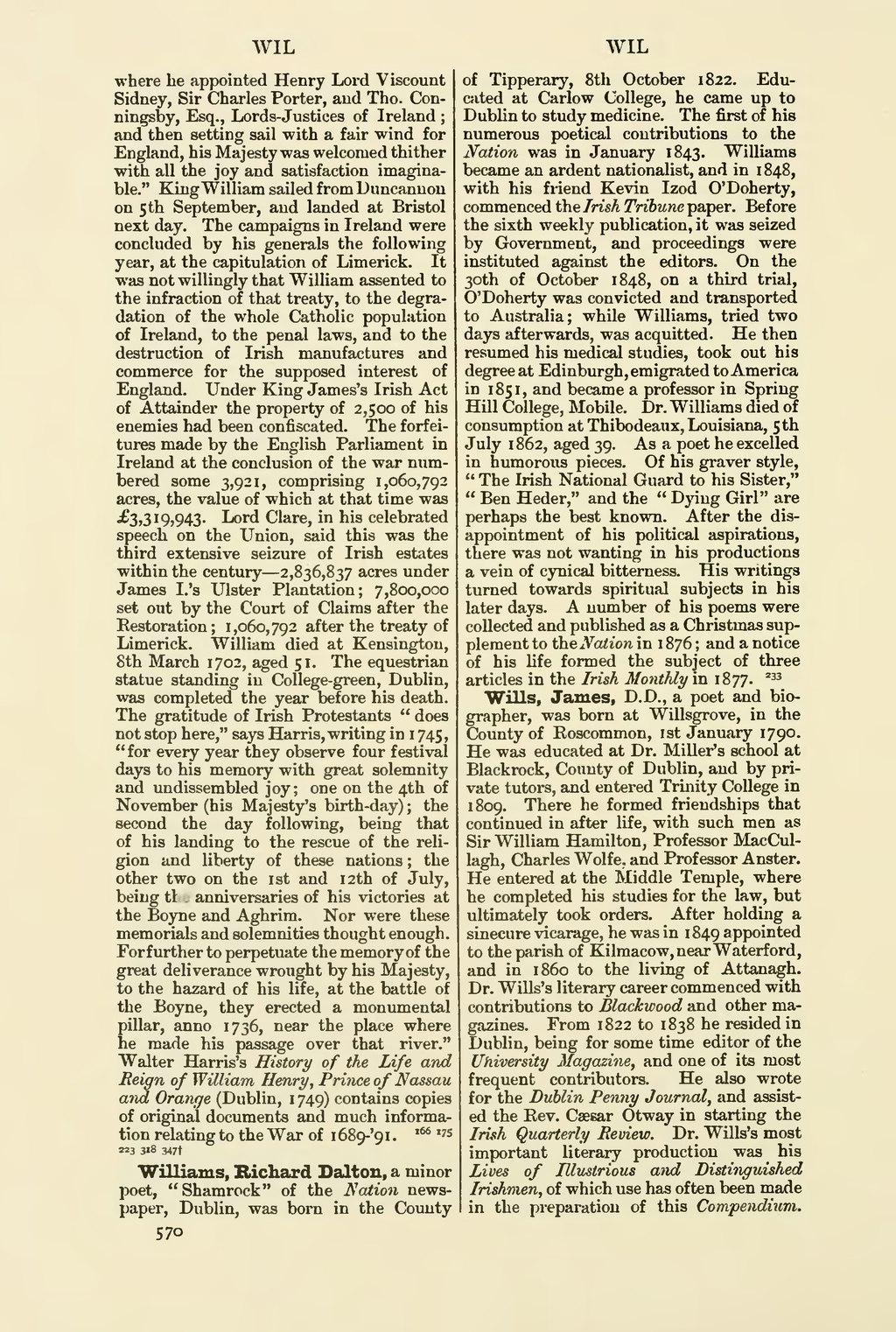where he appointed Henry Lord Viscount Sidney, Sir Charles Porter, and Tho. Conningsby, Esq., Lords-Justices of Ireland; and then setting sail with a fair wind for England, his Majesty was welcomed thither with all the joy and satisfaction imaginable." King William sailed from Duncannon on 5th September, and landed at Bristol next day. The campaigns in Ireland were concluded by his generals the following year, at the capitulation of Limerick. It was not willingly that William assented to the infraction of that treaty, to the degradation of the whole Catholic population of Ireland, to the penal laws, and to the destruction of Irish manufactures and commerce for the supposed interest of England. Under King James's Irish Act of Attainder the property of 2,500 of his enemies had been confiscated. The forfeitures made by the English Parliament in Ireland at the conclusion of the war numbered some 3,921, comprising 1,060,792 acres, the value of which at that time was £3,319,943. Lord Clare, in his celebrated speech on the Union, said this was the third extensive seizure of Irish estates within the century—2,836,837 acres under James I.'s Ulster Plantation; 7,800,000 set out by the Court of Claims after the Restoration; 1,060,792 after the treaty of Limerick. William died at Kensington, 8th March 1702, aged 51. The equestrian statue standing in College-green, Dublin, was completed the year before his death. The gratitude of Irish Protestants "does not stop here," says Harris, writing in 1745, "for every year they observe four festival days to his memory with great solemnity and undissembled joy; one on the 4th of November (his Majesty's birth-day); the second the day following, being that of his landing to the rescue of the religion and liberty of these nations; the other two on the 1st and 12th of July, being the anniversaries of his victories at the Boyne and Aghrim. Nor were these memorials and solemnities thought enough. For further to perpetuate the memory of the great deliverance wrought by his Majesty, to the hazard of his life, at the battle of the Boyne, they erected a monumental pillar, anno 1736, near the place where he made his passage over that river." Walter Harris's History of the Life and Reign of William Henry, Prince of Nassau and Orange (Dublin, 1749) contains copies of original documents and much information relating to the War of 1689-'91. 166 175 223 318 347†
Williams, Richard Dalton, a minor poet, "Shamrock" of the Nation newspaper, Dublin, was born in the County of Tipperary, 8th October 1822. Educated at Carlow College, he came up to Dublin to study medicine. The first of his numerous poetical contributions to the Nation was in January 1843. Williams became an ardent nationalist, and in 1 848, with his friend Kevin Izod O'Doherty, commenced the Irish Tribune paper. Before the sixth weekly publication, it was seized by Government, and proceedings were instituted against the editors. On the 30th of October 1848, on a third trial, O'Doherty was convicted and transported to Australia; while Williams, tried two days afterwards, was acquitted. He then resumed his medical studies, took out his degree at Edinburgh, emigrated to America in 1851, and became a professor in Spring Hill College, Mobile. Dr. Williams died of consumption at Thibodeaux, Louisiana, 5th July 1862, aged 39. As a poet he excelled in humorous pieces. Of his graver style, "The Irish National Guard to his Sister," "Ben Heder," and the "Dying Girl" are perhaps the best known. After the disappointment of his political aspirations, there was not wanting in his productions a vein of cynical bitterness. His writings turned towards spiritual subjects in his later days. A number of his poems were collected and published as a Christmas supplement to the Nation in 1876; and a notice of his life formed the subject of three articles in the Irish Monthly in 1877. 233
Wills, James, D.D., a poet and biographer, was born at Willsgrove, in the County of Roscommon, 1st January 1790. He was educated at Dr. Miller's school at Blackrock, County of Dublin, and by private tutors, and entered Trinity College in 1809. There he formed friendships that continued in after life, with such men as Sir William Hamilton, Professor MacCullagh, Charles Wolfe, and Professor Anster. He entered at the Middle Temple, where he completed his studies for the law, but ultimately took orders. After holding a sinecure vicarage, he was in 1849 appointed to the parish of Kilmacow, near Waterford, and in 1860 to the living of Attanagh. Dr. Wills's literary career commenced with contributions to Blackwood and other magazines. From 1822 to 1838 he resided in Dublin, being for some time editor of the University Magazine, and one of its most frequent contributors. He also wrote for the Dublin Penny Journal, and assisted the Rev. Caesar Otway in starting the Irish Quarterly Review. Dr. Wills's most important literary production was his Lives of Illustrious and Distinguished Irishmen, of which use has often been made in the preparation of this Compendium.
570
